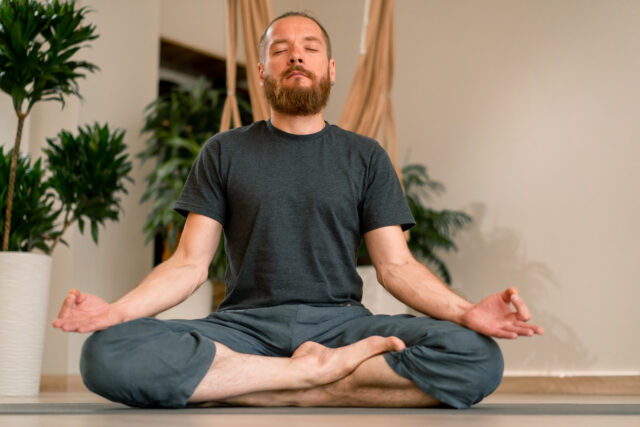Gratitude gets thrown around a lot as a feel-good concept, but actually practising it in a meaningful way is a different story.

It’s more than just listing a few things you’re thankful for, though that can certainly be part of it. In reality, it’s more about shifting how you see the world, even when things aren’t going your way. When done right, thankfulness can change how you experience life, making the good moments richer and the hard times a bit more manageable. We’re not talking toxic positivity here — sometimes life is tough, and it’s hard to see the bright side, after all — but finding a way to recognise the good things despite the bad. Here’s how to practise gratitude in a way that feels personal to you and doesn’t make you want to cringe.
1. Acknowledge the small, overlooked moments.

Big achievements and milestones are easy to appreciate, but real gratitude happens in the small moments — the quiet, everyday things you’d normally take for granted. That first sip from a strong cuppa in the morning, the way the sun feels on your face, or even just a stranger holding the door open for you. When you train yourself to notice these little things, gratitude stops being something you have to force and starts becoming second nature. The more you acknowledge these everyday joys, the more you realise that gratitude isn’t just about grand gestures; it’s about being present.
2. Shift from “I have to” to “I get to.”

Most people go through life complaining about what they have to do — go to work, pay bills, run errands. But shifting your mindset from obligation to opportunity can make all the difference. Instead of thinking, “I have to exercise,” try, “I get to move my body today.” Instead of “I have to work,” try, “I get to earn a living and provide for myself.” It doesn’t mean you have to pretend to love every task, but seeing things as privileges rather than burdens makes gratitude a more natural part of your life. The reality is, many of the things we complain about are things someone else would love to have.
3. Actually express gratitude to people.

Feeling grateful in your head is one thing, but sharing it out loud is what makes it real. A quick “thank you” is nice, but actually telling someone why you appreciate them is what leaves a lasting impact. Whether it’s a quick text, a handwritten note, or just stopping to say, “Hey, I really appreciate what you did,” it makes a difference. We often assume people know we’re grateful for them, but hearing it out loud hits differently. It strengthens relationships, lifts moods, and often inspires other people to pass that gratitude along. The best part? The more you do it, the more natural it becomes.
4. Keep a “gratitude jar” instead of a journal.

Gratitude journals are great, but let’s be real — most people start one and then forget about it after a few weeks. A gratitude jar is an easy, low-maintenance alternative. Every day (or whenever you remember), write down one thing you’re grateful for on a small piece of paper and drop it in the jar. After a while, you’ll build up a collection of moments that you can look back on whenever you need a boost. On bad days, pulling out a random note is a great reminder that even in tough times, there’s always something to appreciate.
5. Start to see your setbacks as opportunities to learn something new.

It’s easy to be grateful when things are going well, but real gratitude shows up when life isn’t perfect. Instead of seeing challenges as unfair, try asking yourself, “What can I learn from this?” or “How will this make me stronger?” Even the worst situations usually have some kind of silver lining, even if it’s just gaining a new perspective. That doesn’t mean forcing toxic positivity or pretending bad things don’t suck; it just means recognising that growth often comes from struggle. Looking back, you’ll realise that some of your biggest challenges taught you the most valuable lessons.
6. Start meals with gratitude.

It doesn’t have to be a formal prayer or a big announcement, but taking a second before you eat to really appreciate your food can be a simple way to practice gratitude daily. Whether it’s a home-cooked meal or a takeaway, pause and acknowledge the fact that you have food in front of you — something not everyone has. It’s a small habit, but it helps change your focus from rushing through meals to actually experiencing them. Plus, it makes eating more enjoyable. Food always tastes better when you take a moment to appreciate it.
7. Stop waiting for “big” moments to feel grateful.

It’s easy to think gratitude is reserved for big life changes—getting a promotion, buying a house, falling in love. But if you’re always waiting for something to happen before you feel grateful, you’ll miss out on all the good stuff in between. Every day is filled with small things worth appreciating: winning a couple of quid on a scratcher, your Pret latte being extra tasty, getting a flyer from work half an hour early, etc. Learning to recognise and savour these moments is what builds real gratitude, not just temporary bursts of happiness.
8. Set a daily gratitude “trigger.”

Sometimes, it helps to have a little reminder built into your day. Choose something you do regularly — brushing your teeth, making coffee, getting into bed — and use it as a reminder to think of something you’re grateful for. It doesn’t have to be complicated — just a quick moment to acknowledge one thing you appreciate. Over time, this small habit rewires your brain to automatically look for things to be grateful for, making gratitude a natural part of your routine.
9. Practise gratitude when things don’t go your way.

When life throws something terrible in your path, gratitude is probably the last thing on your mind. But finding something to appreciate, even in frustrating moments, can help shift your perspective. Missed the bus? Maybe it gave you a few extra minutes to listen to music. Stuck in traffic? Maybe it’s a chance to slow down and breathe. It’s not about pretending bad situations are good; it’s about finding some kind of positive in them. This mindset doesn’t come naturally at first, but the more you do it, the easier it gets.
10. Reflect on past struggles you’ve overcome.

Sometimes, the best way to feel grateful is to look back at how far you’ve come. Think about a time when you felt stuck, lost, or overwhelmed. Chances are, you made it through — and now, you probably see that experience differently. Recognising your past resilience makes it easier to appreciate where you are now. Even if things aren’t perfect, remembering what you’ve already survived puts things into perspective and gives you a reason to feel grateful for your own strength.
11. Stop comparing your life to everyone else’s.

One of the biggest killers of gratitude is comparison. Social media makes it easy to feel like everyone else is doing better than you, but remember, you’re only seeing their best moments, not the full picture. Instead of focusing on what other people have, flip your focus to what’s already good in your own life. The more you appreciate what you have, the less you’ll feel like you’re missing out on something better.
12. Make gratitude part of your nightly routine.

Before you go to sleep, take a few seconds to think of three things that made you feel grateful that day. It doesn’t have to be anything big — just simple things like “I had a nice chat with a friend” or “Work actually went pretty smoothly today.” Ending your day on a positive note helps train your brain to focus on what went right instead of what went wrong. Over time, this habit rewires your mindset to be more naturally grateful, no matter what’s going on.




